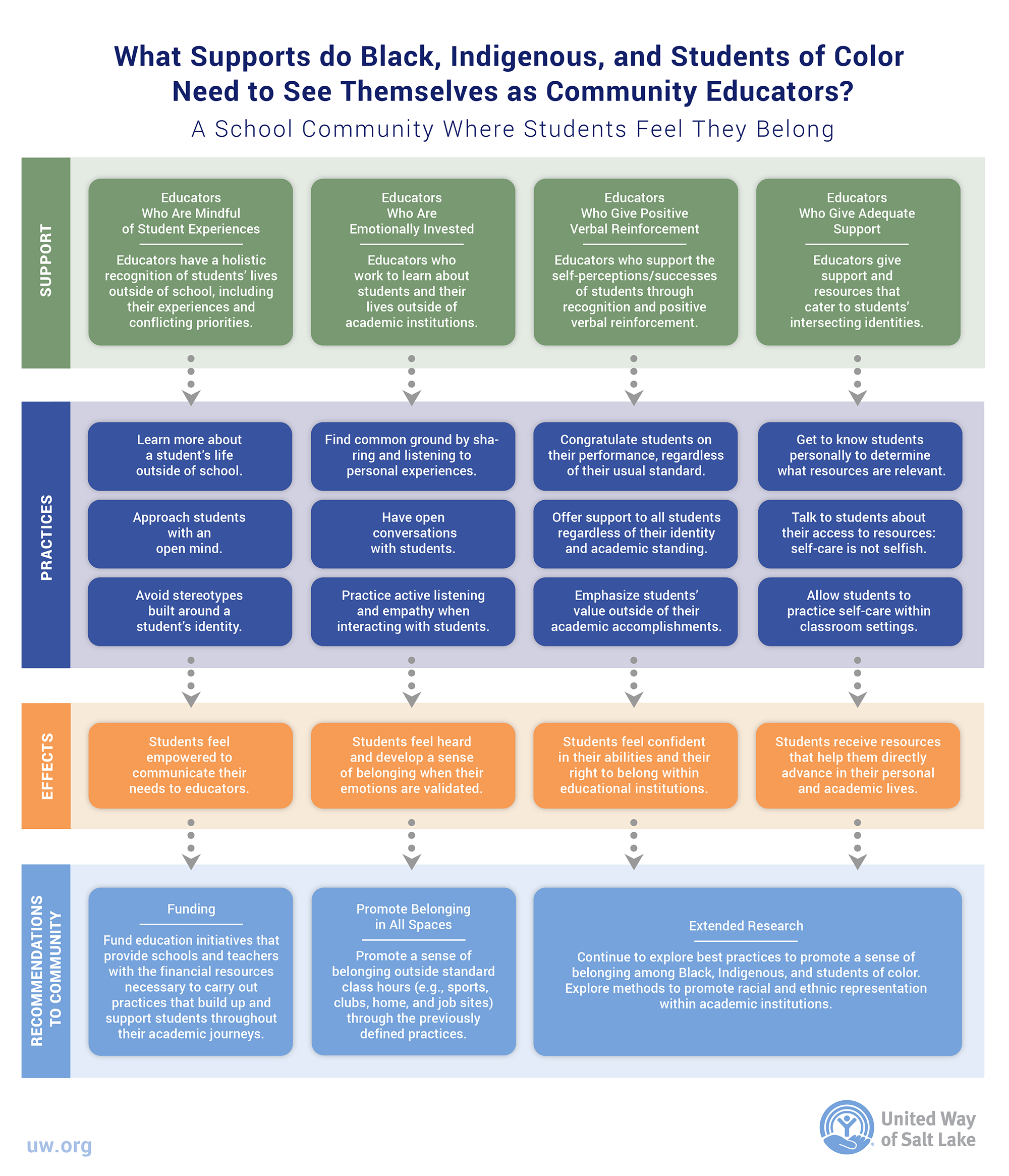Learn how current educators can support BIPOC students and help them envision themselves as community educators.

This community-based project explores the support that Black, Indigenous, and Students of Color currently receive from community educators (e.g. parents, mentors, teachers, friends, etc.), and the kinds of support that would help them envision themselves as community educators. These practices and resources would lead to an increase in BIPOC students pursuing community educator roles and increased overall success of future BIPOC students in their academic journeys.
Click chart for a larger, print-ready version
**The text version of the chart is below.**
What Supports do BIPOC students Need to See Themselves as Community Educators?
They need a school community where students feel like they belong.
Students need educators who are mindful of student experiences
These are educators who have a holistic recognition of students’ lives outside of school, including their experiences and conflicting priorities (e.g., financial support of family or sibling care).
Practices to promote a sense of belonging:
- Learn more about a student’s life outside of school
- Approach students with an open mind
- Avoid stereotypes built around a student’s identity
Effects of practices: Students feel empowered to communicate their needs to educators.
Further recommendations: Fund education initiatives that provide schools and teachers with the financial resources necessary to carry out practices that build up and support students throughout their academic journeys.
Students need educators who are emotionally invested
These are educators who work to learn about students and their lives outside of academic institutions.
Practices to promote a sense of belonging:
- Find common ground by sharing and listening to personal experiences.
- Have open conversations with students.
- Practice active listening and empathy when interacting with students.
Effects of practices: Students feel heard and develop a sense of belonging when their emotions are validated.
Further recommendations: Promote belonging in all spaces including outside standard class hours (e.g., sports, clubs, home, and job sites) through the previously defined practices.
Students need educators to give positive verbal reinforcement
These are educators who support the self-perceptions and successes of students through recognition and positive verbal reinforcement.
Practices to promote a sense of belonging:
- Congratulate students on their performance, regardless of their usual standard.
- Offer support to all students regardless of their identity and academic standing.
- Emphasize students’ value outside of their academic accomplishments.
Effects of practices: Students feel confident in their abilities and their right to belong within education institutions.
Further recommendations: Extended research – continue to explore best practices to promote a sense of belonging among Black, Indigenous, and students of color. Explore methods to promote racial and ethnic representation within academic institutions.
Students need educators to give adequate support
These are educators who prioritize giving supports and resources that cater to students’ intersecting identities.
Practices to promote a sense of belonging:
- Get to know students personally to determine what resources are relevant.
- Talk to students about their access to resources.
- Allow students to practice self-care within classroom settings.
- Remind students that self-care is not selfish.
Effects of practices: Students receive resources that help them directly advance in their personal and academic lives.
Further recommendations: Extended research – continue to explore best practices to promote a sense of belonging among Black, Indigenous, and students of color. Explore methods to promote racial and ethnic representation within academic institutions.
By Xitlally Garcia Barajas, Grassroots Leadership Organizer with United Way of Salt Lake


